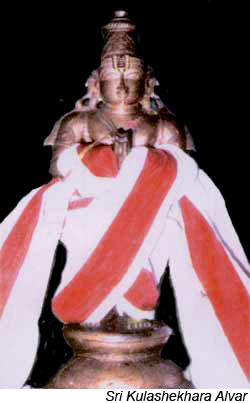
Michael Bühler-Rose’s recent post, explaining ritual as a means to heighten spiritual mindfulness, reminded me of the following verse. In his Mukunda-Mala-Stotra (A Garland of Verses in Praise of Vishnu/Krishna) Kulashekhara Alvar derides observances and practices of sadhana performed in forgetfulness of Lord Narayan. Kulashekhara was the tenth of twelve Alvars, South India’s mystic poets whose writings served as inspiration for the acharyas of the Sri Vaishnava Sampradaya.
Verse 21

All glories to Lord Narayana! Without remembrance of His lotus feet, recitation of scripture is merely crying in the wilderness, regular observance of severe vows enjoined in the Vedas is no more than a way to lose weight, execution of prescribed pious duties is like pouring oblations onto ashes, and bathing at various holy sites is no better than an elephant’s bath.
Translation by Gopiparanadhana dasa, courtesy of The Bhaktivedanta Book Trust International, Inc. Used with permission.
Comments
One response to “From Kulashekhara’s Mukunda-Mala-Stotra”
Wow, that verse was so powerful! I must confess that I just recently discovered the paramount importance of fixing one’s mind on the lotus feet of the Lord. This really seems to be the most confidential truth, ’cause… well, nobody seems to take it seriously. Therefore this topic of mindful yoga-sadhana is so very important.
It’s wired, but I believe the psychology is that if you don’t have the adhikara, the faith, then the principle of “remembrance of His lotus feet” appears only metaphorical. But to remember Lord Narayana, or to be conscious of Krishna really means what the expression literally conveys. There are literally innumerable verses from the scriptures that directly or indirectly stress its importance. Here’s one:
“Lord Krishna is now the ruler of the Bhojas, Vrishnis and Andhakas and is staying at Dvaraka. Since He gives even His own self to anyone who simply remembers His lotus feet, what doubt is there that He, the spiritual master of the universe, will bestow upon His sincere worshiper prosperity and material enjoyment, which are not even very desirable?” (Bhagavata Purana 10.80.11)